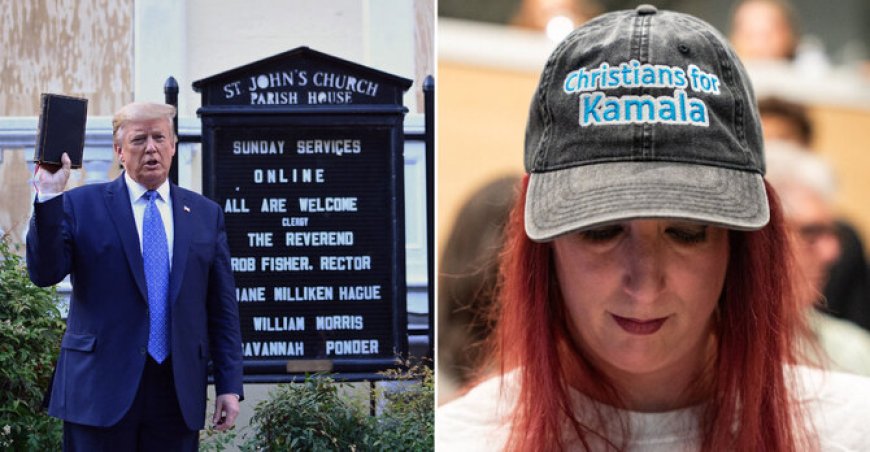Specifically Christian are Trump and Harris? Most Americans Don't Think So, AP reports based onNorman Poll

A fresh poll by the Associated Press-NORC Center for Public Affairs clarifies how Americans view the religious identities of the contenders as the 2024 U.S. presidential contest gets more heated. Though former President Donald Trump and Vice President Kamala Harris both have personal links to Christianity, few Americans see either as very devoted. Only 14% of U.S. respondents say the term "Christian" accurately represents Harris or Trump "very" or "extremely" well, according to the poll taken September 12–16, 2024.
The poll emphasizes a significant dynamic in American politics: whereas religious membership has always been important in political campaigns, it seems to mean less in this election cycle—especially with regard to Trump's most ardent followers. For Harris, her political experience and mixed religious background have molded impressions in distinct ways.
Trump: Evangelical Support Free of Religious Expectations
Despite doubts about his personal faith, Donald Trump, who grew up Presbyterian but subsequently identified as a nondenominational Christian, nonetheless commands great support from white evangelical Protestants. The research shows that while just roughly 20% of white evangelicals believe "Christian" defines him extremely well, almost 70% of them see Trump favorably.
This seeming discrepancy between Trump's Christian identity and his backing from evangelicals is typical of a larger change in evangelical political conduct. R. Marie Griffith, a religion and politics professor at Washington University in St. Louis, claims that white evangelicals have progressively given policy results—such as the nomination of conservative, anti-abortion Supreme Court justices—increasing priority above personal piety or morality in their leaders.
"They don't care if he's religious or not," Griffith said, pointing out how many evangelicals see Trump as a tool to further more general objectives. Evangelical leaders sometimes describe Trump as "God's man" for the office, she said, implying that moral or religious shortcomings come second to the supposed larger good of his re-election.
This phenomena captures the change in evangelical politics, whereby once-critical moral standards have been subordinated to pragmatic support for a candidate who supports important causes. For Trump, this comprises his part in redefining the court, undoing abortion rights, and advancing conservative principles.
Harris: Progressive base and mixed religious identity
Self-identified Baptist vice president Kamala Harris comes from a religious background shaped by her mother's native India's spiritual traditions. Though this percentage is higher among Black Protestants, the poll shows that just around 40% of Americans consider "Christian" as a label that defines her well, even though her faith speaks to certain of her fans.
Black Protestant voters especially support Harris strongly; 75% of them see her favorably and 60% of them say she reflects their religious values. Professor of religious studies Anthea Butler of the University of Pennsylvania proposed that Harris's appeal to this group might be explained by her interfaith background and relationship to the Black church.
She observed that African Americans typically view interfaith couples more holistically, and Harris's background speaks to those views. Harris's public image as a Christian may be less clear, though, despite her religious background, partially due to her late entry into the presidential contest following President Joe Biden's July resignance. Many Americans so could just not know anything about her religious life.
Morality and honesty: a more general cynicism in politics
The research also reveals a strong-rooted pessimism among voters on the moral and ethical standards of politicians in general. Neither Harris nor Trump performed very well when asked if adjectives like "honest" or "moral" characterizes them. Just 15% of Americans felt the same about Trump, while just one-third of Americans claimed these terms fit Harris. Including those who felt these terms "somewhat" defined the contenders, the figures for Harris and Trump climbed to over half and over one-third respectively.
Griffith pointed out that this reflects a larger disenchantment with the political system, where many Americans believe all politicians are naturally dishonest. "People are really so convinced that all politicians are liars," she remarked, implying that rather than personal shortcomings, both contenders might be suffering from a general lack of faith in political people.
Organizing the Faithful: Variances in Approach for Harris and Trump
Both contenders have targeted religious voters in their campaigns, notwithstanding their mixed opinions on their faith. Focusing on her competency, credentials, and dedication to progressive ideas, Harris—with the support of organizations like the Black Church PAC—is attempting to inspire faith-based voters. Rev. Traci Blackmon urged churches to assist members in registering to vote and provide transportation to polling places during a recent conference.
"Kamala Harris is not perfect – no one is perfect," Blackmon remarked. "But what she is is capable. She is ready what she is is. She is qualified rather than anything else.
For Trump, regardless of personal faith considerations, his constituency of white evangelical Protestants stays firm in their support. As Anthea Butler pointed out, Trump's policy record—especially his court nominations—has rendered him almost untouchable among conservative Christian voters. He stays "their guy no matter what," for many of them.
A Changing Religious Environment
The AP-NORC poll emphasizes how religion is changing its influence in American politics, where ideological alignment and policy results now determine voter support more so than personal faith. Although both Trump and Harris assert Christian identities, their capacity to appeal to religious voters seems more correlated with their political behavior than with their personal values.
It will be intriguing to observe how these dynamics change and whether religious identification will be crucial in the result of the 2024 campaign.













































